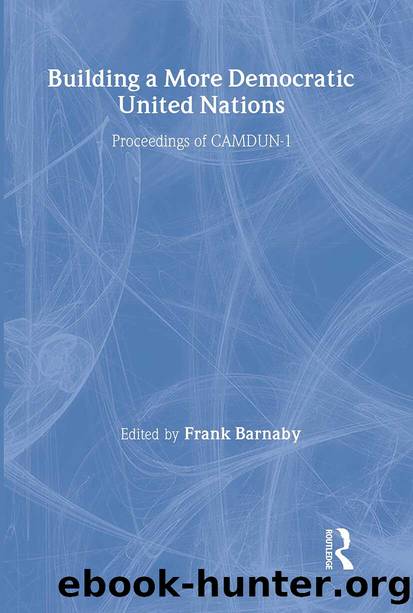Building a More Democratic United Nations: Proceedings of CAMDUN-1 by Frank Barnaby

Author:Frank Barnaby [Barnaby, Frank]
Language: eng
Format: epub
Tags: Political Science, General
ISBN: 9780714634425
Google: rcYYoLsFNmAC
Goodreads: 3842215
Publisher: Psychology Press
Published: 1991-01-15T06:50:38+00:00
Decisions by Consensus and the Veto
As our understanding of interdependence develops, more and more decisions are made on the basis of consensus and cooperation.
When the United Nations was founded, decisions were on occasion passed unanimously, but most were taken by majority vote which heightened the adversarial atmosphere at the UN. As problems like those relating to the Law of the Sea and the Environment were taken up by the UN (problems that depended for their resolution on a wholehearted participation of people everywhere), it became apparent that unless all countries deeply agreed to a course of action, nothing would be carried out.
And so consensus was introduced and with it the reverse side of the coin: the veto in the General Assembly, which could be executed by the smallest member-nation, on issues where decisions were made by consensus. This veto parallels that held by the five permanent members in the Security Council, although it is not mentioned in the Charter. The emergence of consensus decisions and the veto are not wrong and cannot be abolished: they are also a natural consequence of our interdependence.
With a need to make decisions by consensus came a need for increased cooperation and caring for all Earthâs phenomena, for human beings are not only interdependent with one another, but also with other life forms and with the systems that govern our planetary home. And because all phenomena and all planets are subject to the laws that govern our Universe, consensus, caring and cooperation are required to meet higher standards: they do not relate merely to relations between people(s), they become effective only when we are âin syncâ with the laws which govern our planetary home and our Universe. As the United Kingdom stressed in the 45th General Assembly: âWe are not the lords, we are the Lordâs creatures, the trustees of this planet, charged today with preserving life itself â preserving life with all its mystery and all its wonder.â
In 1989 62 per cent of all decisions made in the General Assembly were by consensus, as opposed to 57 per cent the year before. One UN expert assessed the atmosphere of the Assembly as follows: âFor the first time all issues were at one side of the table and all nations at the other.â This indicates a large increase in consensus and cooperation at the interhuman level over past years.
Yet consensus-building, caring and cooperation are still in an initial phase, while methods of arm-twisting and bartering between more narrow and short-term self-interests are still evident.
All efforts at global problem-solving must fail, if they are âout of syncâ with the laws that naturally govern our planet and the Universe. How can men and women input the system of the United Nations, so that durable solutions can be found?
Download
This site does not store any files on its server. We only index and link to content provided by other sites. Please contact the content providers to delete copyright contents if any and email us, we'll remove relevant links or contents immediately.
Killers of the Flower Moon by David Grann(3240)
Machine Learning at Scale with H2O by Gregory Keys | David Whiting(2292)
Will by Will Smith(2043)
Guns, Germs and Steel by Diamond Jared(1884)
Borders by unknow(1786)
The Room Where It Happened by John Bolton;(1721)
The Color of Law by Richard Rothstein(1575)
Once Upon a Broken Heart by Stephanie Garber(1486)
Water Rights and the Environment in the United States by John Burch(1414)
Friends, Lovers, and the Big Terrible Thing by Matthew Perry(1329)
Examples & Explanations: Administrative Law by William F. Funk & Richard H. Seamon(1326)
A Short History of War by Jeremy Black(1300)
HBR's 10 Must Reads 2022 by Harvard Business Review(1256)
Pharmacy Practice and The Law by Richard Abood(1254)
The Strength In Our Scars by Bianca Sparacino(1249)
That Every Man Be Armed by Stephen P. Halbrook(1237)
The Guarded Gate by Daniel Okrent(1220)
515945210 by Unknown(1209)
Injustices by Ian Millhiser(1199)
